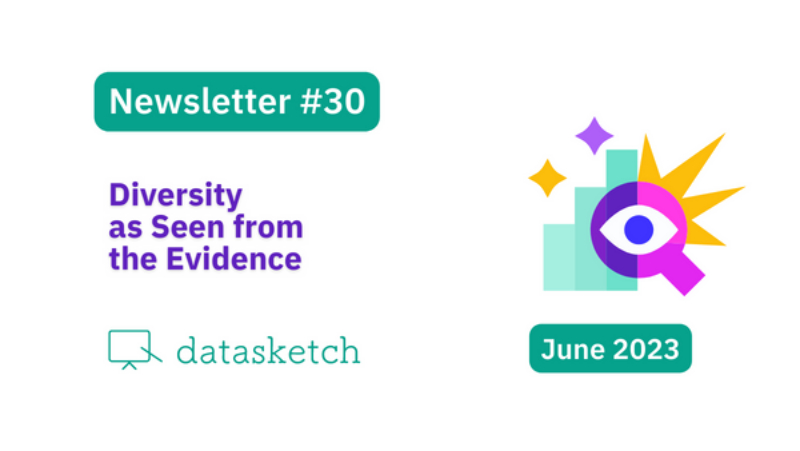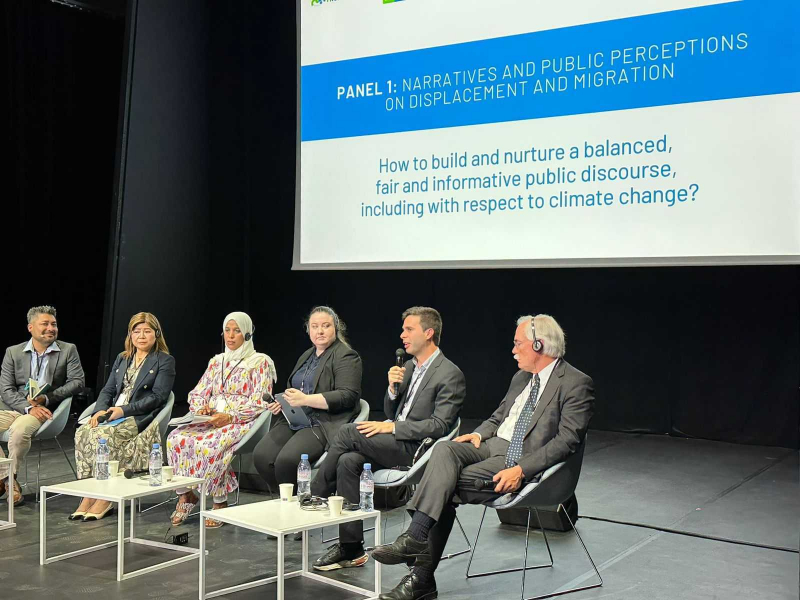Diversity as Seen from the Evidence Datasketch Newsletter #30
Diversity | LGBTIQ+ | Latin America and the Caribbean
Available in:

One of Datasketch’s five values is the fight for equality and inclusion. We express this both in the organization’s internal policies and in our more public actions, such as the Datos y Guaros on gender and health, which was held last week.
To end June, and one day after Pride Day, we share with you seven projects based on data about people with diverse sexual orientations, gender identities and/or gender expressions, which inspire us because they show the underreporting, make the problems visible and help advocacy or decision-making to improve inclusion.
Join us… on this journey of projects for diversity (Just a Regina George’s reference).

Data to Fight for Diversity
Attend the Latin American Initiative for Open Rights (ILDA) webinar to learn about the trajectory of LGBTIQ+ organizations collecting data to confront discrimination and violence and the underreporting that prevents us from knowing the magnitude of the problem. In this space, we will present the project we are doing together with Central American organizations, SocialTIC and those of us who wrote this newsletter. 😉
💻 Schedule on June 30th at 11:00 am for Colombia
LGBTI Survey Data Browser in Europe
The European Union Agency for Fundamental Rights surveyed about 140 000 people in Member States on violence and discrimination affecting them. It also gave a broader perspective by including issues such as rights awareness, work and education experiences, socioeconomic conditions, health and housing.
ILGA World Database
Let’s start with the fact that this database created by the International Lesbian, Gay, Bisexual, Trans and Intersex Association (ILGA) has data from more than 190 States on sexual orientation, gender identity and expression and sexual characteristics (ECOSIEGCS) rights. It also includes international treaties and new developments, useful for advocacy, research and communication. (Our thanks to Lau Ortiz for sending it. 💞)
Creating Spaces for Dialogue: exploring queer cinema in Southeast Asia
This proposal is made from the seventh art in Indonesia, Vietnam, and Thailand, among other countries. It has many ways to show the data on the vernacular queer representations, the history of this cinematography, even the database of all the films as a billboard.
📽️ Lights, camera, and get to the action
Open Budget with a Gender and Diversity Perspective
This open government initiative of the Argentina Ministry of Economy presents to the public the destination of public entities' resources to reduce inequalities, as seen according to income and unpaid work gaps.
LGTBIQ+ Labor Protection
It’s a chance to show off one of our Datasketch Store designs. An unfilled rainbow represents 48% of countries in Latin America and the Caribbean with labor protection against discrimination based on sexual orientation.
👕 See what’s behind the design.
Actions with data in the region
Escuela de Datos posted on Twitter a set of resources in Latin America to learn about and from organizations working for diversity recognition for you to keep track of. Our #datalove for Escuela, because of sharing the dashboard on judicial decisions on the LGBTIQ+ population, which we did with Colombia Diversa. ❤️
On the radar
- 👩🏾💻 Hackcorruption, the hackathon against corruption, Hackcorruption, is coming August 18-20 in Bogota and extends its deadline for applications to July 3 | Accountability Lab
- 🦸🏾 How data helped Mexico City reduce high-impact crime by more than 50% using the Sistema Ajolote, which we developed for the CDMX Open Data Portal | World Economic Forum
- 🤷🏾♀️ Stable Diffusion’s text-to-image model amplifies stereotypes about race and gender: what are the implications | Bloomberg
- ✍🏾 Call for research papers for the 2023 Data Festival | Inter-American Development Bank (IDB), Latin American Open Data Initiative (ILDA) and Global Partnership for Sustainable Development Data
- 🩸 European Economic Area Resume Data Donation Campaign to Assess Potential Discrimination by Automated Systems to Job Applicants | Fairness and Intersectional Non-Discrimination in Human Recommendation (FINDHR)
- 🗺️ Geocoding of Charles Joseph Minard’s famous map “Napoleon in Russia” | Jindra Lacko
What’s coming?
Julio Cesar Daly, director of the Xenophobia Barometer, was speaking at the Global Forum on Migration in Paris about narratives and perceptions of migration and displacement in Latin America and the Caribbean. What’s noteworthy is that we are working with the Barometer team on redesigning their website with innovative interfaces to showcase this data. Stay tuned for the launch!
Meanwhile, JP and Edu will be in Sao Paulo for the International Congress of Investigative Journalism from June 29 to July 2, organized by Abraji. Write to them if you’re also at the event!

Glad you made it this far. Your newsletter recommendation is the best way to grow our community and reach more interested people. Please share it! 💌




